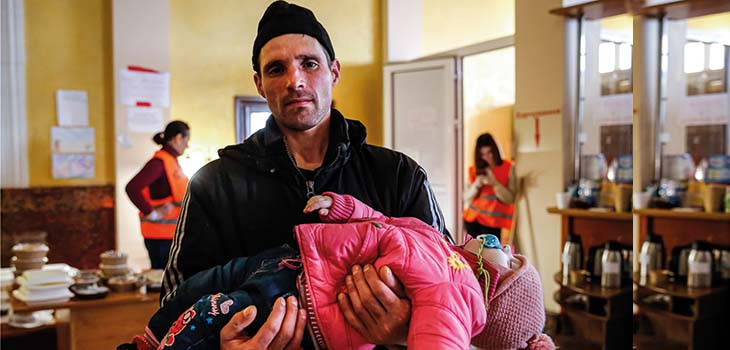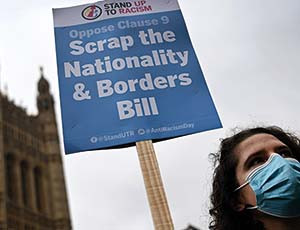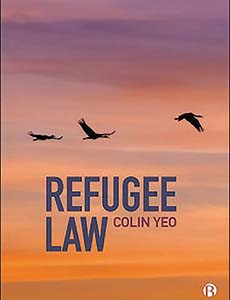*/

Politicians in the United Kingdom have for years asserted that genuine refugees should seek asylum in the first safe country they reach. Coincidentally, the United Kingdom lies on the edge of Europe, far away from any refugee-producing country. The implication has always been that any refugees that do somehow manage to reach our country cannot be genuine refugees. If they were, they would have stayed in some other country.
The present government has doubled down on this philosophy. The Nationality and Borders Bill will, for the first time, criminalise all refugees arriving in the United Kingdom in lorries or small boats. A deal has been reached with Rwanda which will supposedly see some refugees exported there, out of sight and mind. Instead, ministers tout their ‘bespoke’ refugee schemes for Syrians, Afghans and now Ukrainians as national alternatives to the international system established by the Refugee Convention.
The Ukrainian refugee crisis shows us how wrong-headed the government’s approach really is. Why should Ukrainians who had fled for their lives with just a suitcase or a rucksack have to stay in Poland, Moldova or the first country they reach? What if they have family members elsewhere, or even just better prospects of finding somewhere to sleep other than a camp bed in a school gymnasium? Why should the immediately adjacent countries be expected to absorb literally millions of refugees? Perhaps more to the point, can they really be expected to build camps and detain those refugees to stop them moving on elsewhere? If the refugees do move on, should Poland and Moldova be required to receive them back from countries hosting very few refugees, like the United Kingdom?
All of these questions apply just as much to other refugees. Why should Turkey host so many Syrians and why must those Syrians stay put? Why should Pakistan host so many Afghans and what should happen to them if they move on? For reasons of political expediency, desperate Ukrainians arriving illegally via Ireland or in small boats are unlikely to end up in Rwanda. This begs the question of how it can possibly be acceptable to discriminate and send other refugees there.
These questions are not new. The Refugee Convention was designed to answer them. It carefully but imperfectly – there is no perfect solution – balances the interests of vulnerable refugees with the rights of sovereign states to control their borders.
The Refugee Convention does not confer on refugees an enforceable right to enter a country in order to claim asylum. The closest it comes is Article 33, the right of non-return, which states that ‘[n]o Contracting State shall expel or return (refouler) a refugee in any manner whatsoever to the frontiers of territories where his life or freedom would be threatened’.
We can see the vital importance of this commitment today. The countries adjacent to Ukraine must not refuse to admit a person whose life or freedom would be threatened. This duty applies at the border and within the country of refuge. The vast majority of countries around the world respect this principle, which has been argued to have attained the status of customary international law. When large numbers of people are fleeing for their lives, they are almost always permitted to enter adjacent countries.
The duty is also engaged if a refugee were to arrive in a distant country like the United Kingdom directly by plane, for example, and the only place they could be removed to was a territory where their life or freedom would be threatened.
But where a refugee passes through one or more safe countries to reach another, Article 33 is not engaged. It is not against the letter of Article 33 of the Refugee Convention for the United Kingdom to send a Ukrainian refugee to Poland, as long as that refugee’s life or freedom would not be threatened there. It may represent a profound lack of solidarity with the refugee, and indeed with Poland, but it is not contrary to Article 33.
States are obliged to admit their own citizens but not the citizens of other countries. However much ministers might like to send refugees back to safe third countries, they cannot do so without the agreement of those countries. The United Kingdom used to have a returns agreement with Poland and other European Union countries, called the Dublin system. We left that agreement behind with Brexit. An alternative deal has now been done with Rwanda but it remains to be seen whether it is really feasible in practice to send refugees there.
The drafters of the Refugee Convention, some of whom had themselves been refugees, knew that many pre-war and wartime refugees had fled through multiple countries in search of a place of sanctuary. In order to protect them, Article 31 was included in the convention. This is sometimes referred to as the non-penalisation clause. It prevents countries from imposing penalties on refugees ‘on account of their illegal entry or presence’.
There are conditions the refugees must meet, though. To be protected by Article 31 the refugee must have come ‘directly from a territory where their life or freedom was threatened’ then presented themselves ‘without delay to the authorities’ and be able to ‘show good cause for their illegal entry or presence’.
Some have tried to argue that the ‘coming directly’ requirement should be taken literally and that travel through a safe third country means a refugee can be penalised. In a landmark case in 1999 called ex parte Adimi, the High Court ruled that the words should be read expansively, with emphasis given to the ‘show good cause’ requirement rather than the speed and means of travel.
Ignoring Article 31 entirely, the Nationality and Borders Bill makes it a criminal offence for any refugee to enter the United Kingdom without permission. This is obviously and incontestably inconsistent with the Refugee Convention. Ministers have said that only a handful of refugees will actually be prosecuted but this sort of highly selective prosecution policy is anathema to a fair, non-discriminatory criminal justice system.
Unlike every other country in European, the United Kingdom requires Ukrainians to get a visa before they travel. Any Ukrainian entering the UK without a visa will be committing a criminal offence under this new law. Ministers say there is no reason for a Ukrainian to enter the United Kingdom without a visa. But we have seen how pitifully slow the ‘bespoke’ routes have been.
At the time of writing, some two months after the Russian invasion began, over 5 million refugees had fled. The United Kingdom had admitted only 22,000 of them. Not only does this show minimal solidarity with Ukrainian refugees themselves but it also shows minimal solidarity with countries doing far, far more than the United Kingdom to host and support refugees.
The United Kingdom’s ‘bespoke’ resettlement schemes for some refugees are welcome. But they should be additional to the Refugee Convention, not instead of it. If Ukrainian or other refugees manage somehow to reach our shores, they should not be criminalised for doing so. Nor should they be exported to Rwanda or elsewhere. Either outcome merely heaps further misery on people who have already suffered too much.

Pictured above: Protesters demonstrate outside Parliament on 27 January 2022 against the Nationality and Borders Bill. Pictured top: Exodus of Ukrainian refugees continues - in Lviv, Ukraine a Ukrainian father and baby on arrival at the temporary accommodation created at the main train station (5 April 2022).

Refugee Law by Colin Yeo concisely explains the evolution and history of international refugee law and the ways in which the Refugee Convention and international human rights law protect refugees in the modern world (Bristol University Press: 2022).

Politicians in the United Kingdom have for years asserted that genuine refugees should seek asylum in the first safe country they reach. Coincidentally, the United Kingdom lies on the edge of Europe, far away from any refugee-producing country. The implication has always been that any refugees that do somehow manage to reach our country cannot be genuine refugees. If they were, they would have stayed in some other country.
The present government has doubled down on this philosophy. The Nationality and Borders Bill will, for the first time, criminalise all refugees arriving in the United Kingdom in lorries or small boats. A deal has been reached with Rwanda which will supposedly see some refugees exported there, out of sight and mind. Instead, ministers tout their ‘bespoke’ refugee schemes for Syrians, Afghans and now Ukrainians as national alternatives to the international system established by the Refugee Convention.
The Ukrainian refugee crisis shows us how wrong-headed the government’s approach really is. Why should Ukrainians who had fled for their lives with just a suitcase or a rucksack have to stay in Poland, Moldova or the first country they reach? What if they have family members elsewhere, or even just better prospects of finding somewhere to sleep other than a camp bed in a school gymnasium? Why should the immediately adjacent countries be expected to absorb literally millions of refugees? Perhaps more to the point, can they really be expected to build camps and detain those refugees to stop them moving on elsewhere? If the refugees do move on, should Poland and Moldova be required to receive them back from countries hosting very few refugees, like the United Kingdom?
All of these questions apply just as much to other refugees. Why should Turkey host so many Syrians and why must those Syrians stay put? Why should Pakistan host so many Afghans and what should happen to them if they move on? For reasons of political expediency, desperate Ukrainians arriving illegally via Ireland or in small boats are unlikely to end up in Rwanda. This begs the question of how it can possibly be acceptable to discriminate and send other refugees there.
These questions are not new. The Refugee Convention was designed to answer them. It carefully but imperfectly – there is no perfect solution – balances the interests of vulnerable refugees with the rights of sovereign states to control their borders.
The Refugee Convention does not confer on refugees an enforceable right to enter a country in order to claim asylum. The closest it comes is Article 33, the right of non-return, which states that ‘[n]o Contracting State shall expel or return (refouler) a refugee in any manner whatsoever to the frontiers of territories where his life or freedom would be threatened’.
We can see the vital importance of this commitment today. The countries adjacent to Ukraine must not refuse to admit a person whose life or freedom would be threatened. This duty applies at the border and within the country of refuge. The vast majority of countries around the world respect this principle, which has been argued to have attained the status of customary international law. When large numbers of people are fleeing for their lives, they are almost always permitted to enter adjacent countries.
The duty is also engaged if a refugee were to arrive in a distant country like the United Kingdom directly by plane, for example, and the only place they could be removed to was a territory where their life or freedom would be threatened.
But where a refugee passes through one or more safe countries to reach another, Article 33 is not engaged. It is not against the letter of Article 33 of the Refugee Convention for the United Kingdom to send a Ukrainian refugee to Poland, as long as that refugee’s life or freedom would not be threatened there. It may represent a profound lack of solidarity with the refugee, and indeed with Poland, but it is not contrary to Article 33.
States are obliged to admit their own citizens but not the citizens of other countries. However much ministers might like to send refugees back to safe third countries, they cannot do so without the agreement of those countries. The United Kingdom used to have a returns agreement with Poland and other European Union countries, called the Dublin system. We left that agreement behind with Brexit. An alternative deal has now been done with Rwanda but it remains to be seen whether it is really feasible in practice to send refugees there.
The drafters of the Refugee Convention, some of whom had themselves been refugees, knew that many pre-war and wartime refugees had fled through multiple countries in search of a place of sanctuary. In order to protect them, Article 31 was included in the convention. This is sometimes referred to as the non-penalisation clause. It prevents countries from imposing penalties on refugees ‘on account of their illegal entry or presence’.
There are conditions the refugees must meet, though. To be protected by Article 31 the refugee must have come ‘directly from a territory where their life or freedom was threatened’ then presented themselves ‘without delay to the authorities’ and be able to ‘show good cause for their illegal entry or presence’.
Some have tried to argue that the ‘coming directly’ requirement should be taken literally and that travel through a safe third country means a refugee can be penalised. In a landmark case in 1999 called ex parte Adimi, the High Court ruled that the words should be read expansively, with emphasis given to the ‘show good cause’ requirement rather than the speed and means of travel.
Ignoring Article 31 entirely, the Nationality and Borders Bill makes it a criminal offence for any refugee to enter the United Kingdom without permission. This is obviously and incontestably inconsistent with the Refugee Convention. Ministers have said that only a handful of refugees will actually be prosecuted but this sort of highly selective prosecution policy is anathema to a fair, non-discriminatory criminal justice system.
Unlike every other country in European, the United Kingdom requires Ukrainians to get a visa before they travel. Any Ukrainian entering the UK without a visa will be committing a criminal offence under this new law. Ministers say there is no reason for a Ukrainian to enter the United Kingdom without a visa. But we have seen how pitifully slow the ‘bespoke’ routes have been.
At the time of writing, some two months after the Russian invasion began, over 5 million refugees had fled. The United Kingdom had admitted only 22,000 of them. Not only does this show minimal solidarity with Ukrainian refugees themselves but it also shows minimal solidarity with countries doing far, far more than the United Kingdom to host and support refugees.
The United Kingdom’s ‘bespoke’ resettlement schemes for some refugees are welcome. But they should be additional to the Refugee Convention, not instead of it. If Ukrainian or other refugees manage somehow to reach our shores, they should not be criminalised for doing so. Nor should they be exported to Rwanda or elsewhere. Either outcome merely heaps further misery on people who have already suffered too much.

Pictured above: Protesters demonstrate outside Parliament on 27 January 2022 against the Nationality and Borders Bill. Pictured top: Exodus of Ukrainian refugees continues - in Lviv, Ukraine a Ukrainian father and baby on arrival at the temporary accommodation created at the main train station (5 April 2022).

Refugee Law by Colin Yeo concisely explains the evolution and history of international refugee law and the ways in which the Refugee Convention and international human rights law protect refugees in the modern world (Bristol University Press: 2022).


Now is the time to tackle inappropriate behaviour at the Bar as well as extend our reach and collaboration with organisations and individuals at home and abroad
A comparison – Dan Monaghan, Head of DWF Chambers, invites two viewpoints
And if not, why not? asks Louise Crush of Westgate Wealth Management
Marie Law, Head of Toxicology at AlphaBiolabs, discusses the many benefits of oral fluid drug testing for child welfare and protection matters
To mark International Women’s Day, Louise Crush of Westgate Wealth Management looks at how financial planning can help bridge the gap
Casey Randall of AlphaBiolabs answers some of the most common questions regarding relationship DNA testing for court
Marking Neurodiversity Week 2025, an anonymous barrister shares the revelations and emotions from a mid-career diagnosis with a view to encouraging others to find out more
David Wurtzel analyses the outcome of the 2024 silk competition and how it compares with previous years, revealing some striking trends and home truths for the profession
Save for some high-flyers and those who can become commercial arbitrators, it is generally a question of all or nothing but that does not mean moving from hero to zero, says Andrew Hillier
Patrick Green KC talks about the landmark Post Office Group litigation and his driving principles for life and practice. Interview by Anthony Inglese CB
Desiree Artesi meets Malcolm Bishop KC, the Lord Chief Justice of Tonga, who talks about his new role in the South Pacific and reflects on his career